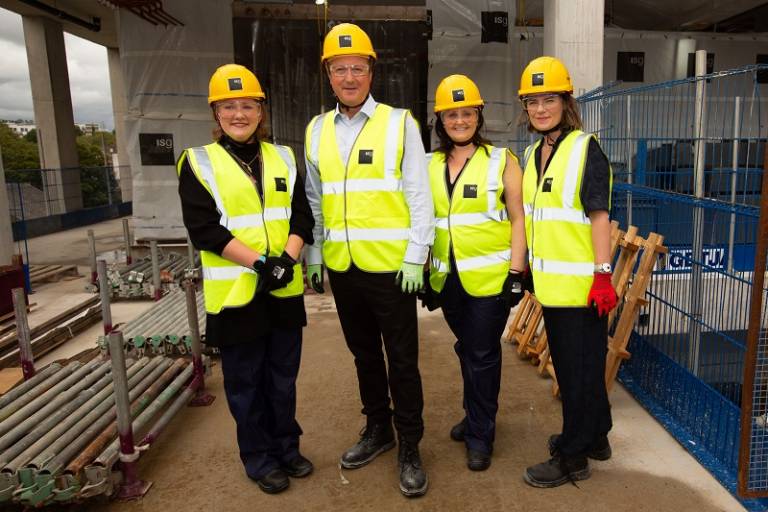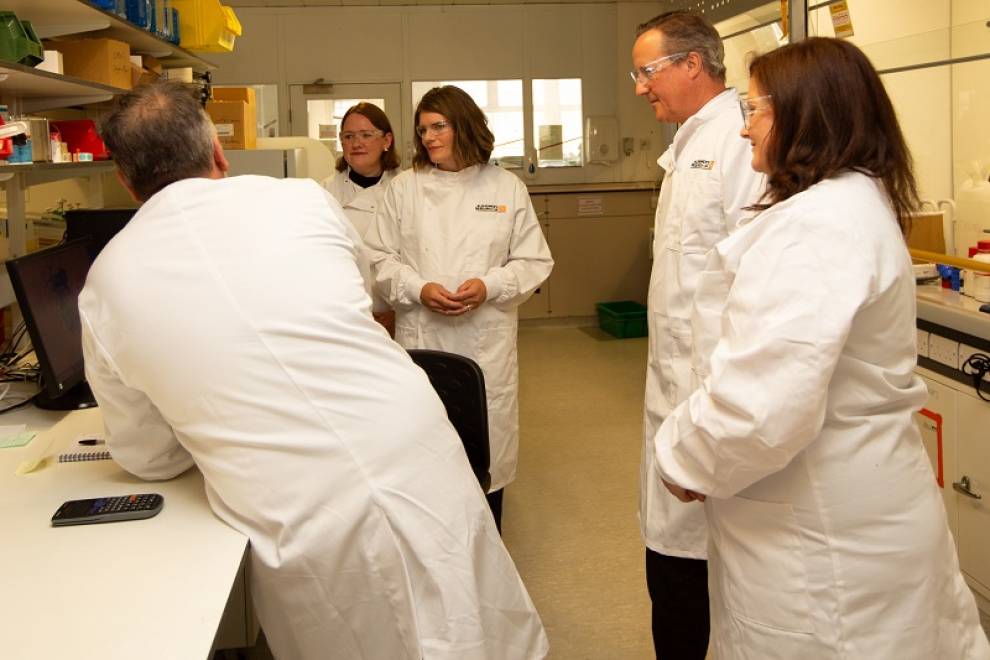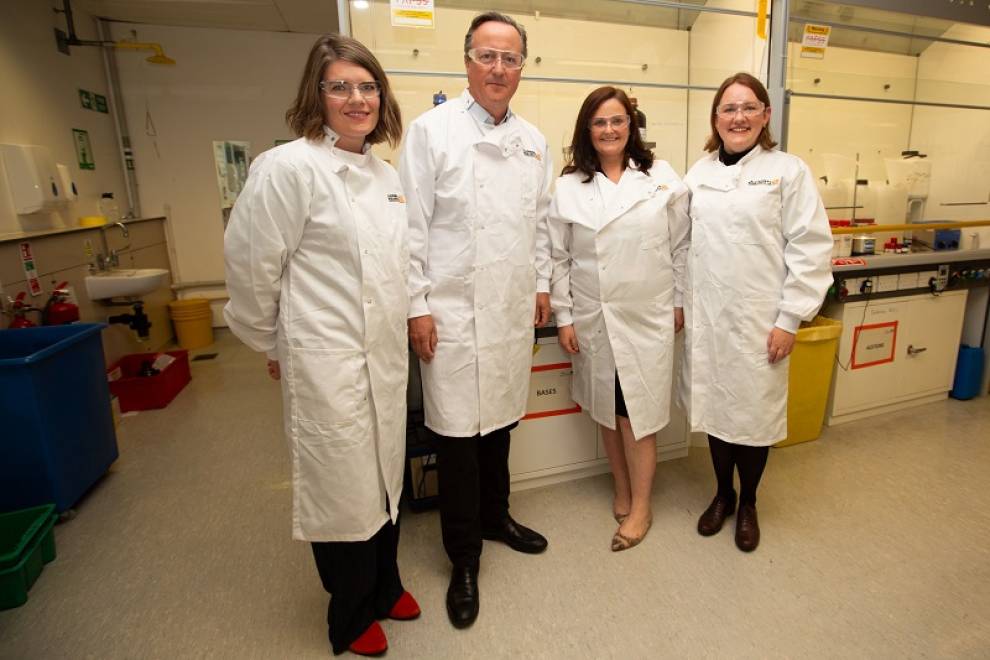David Cameron visits new centre of excellence for UCL Neuroscience to mark World Alzheimer’s Day
21 September 2023
Former Prime Minister and President of Alzheimer’s Research UK (ARUK), David Cameron, visited UCL this week to observe the impact of the work the charity funds, including the ARUK UCL Drug Discovery Institute and the new world-leading facility for UCL Neuroscience.

Professor Fiona Ducotterd (ARUK UCL Drug Discovery Institute) and Professor Selina Wray (UCL Queen Square Institute of Neurology) led the visit and gave Mr Cameron detailed insights into their group’s translational research programmes and how the future looks for dementia research.
Mr Cameron toured the industry-standard drug discovery capabilities in the ARUK Drug Discovery Institute labs, currently housed within the Cruciform Building, on UCL’s Bloomsbury Campus.
The group also visited the new UCL Neuroscience facility at 256 Grays Inn Road,, near Kings Cross, where the labs will move next year. The purpose-built, state-of-the-art neuroscience centre is currently in construction and will open in 2024. It will be a comprehensive, coordinated neuroscience research hub, offering opportunities for multidisciplinary collaboration across basic and clinical science and drug discovery.
Professor Wray, said: “It was a pleasure to welcome Alzheimer’s Research UK President, Mr David Cameron, to UCL to discuss some of the exciting dementia research ARUK are funding at UCL, and to show him the progress being made on the new neuroscience centre at Grays Inn Road. Through the Prime Minister’s dementia challenge and subsequently in his role with ARUK, David Cameron has ensured dementia research is a national priority, so it was a privilege to share some of our excitement and optimism about the latest breakthroughs and ongoing research with him.”
Professor Ducotterd, said: “The effort to find effective dementia treatments involves the precise integration of interdisciplinary teams. Our work with Alzheimer’s Research UK in the Drug Discovery Institute at the core of UCL is doing just that and we can use learnings from basic science right through to the clinical setting to inform our drug discovery programs. It was a privilege to showcase our work and discuss our shared vision and mission with David Cameron in his role as President of ARUK and we will continue to combine disciplines and learnings to progress our science for our patients who are waiting.”
David Cameron joined Alzheimer’s Research UK as President in January 2017, and since then has helped the charity raise £20 million for research, as well as helping to open up new strategic research partnerships and collaborations.
While in office as Prime Minister, in 2012, Mr Cameron launched the Dementia Challenge – a programme of action to deliver sustained improvements in health and care, create dementia-friendly communities, and boost dementia research.

Following this, he hosted the first G8 dementia summit in 2013, bringing together ministers, researchers, pharmaceutical companies and charities to discuss what can be done to stimulate greater investment and innovation in dementia research, improve prevention and treatment, and improve quality of life for people living with the condition.
In 2015, he published the Prime Minister’s challenge on dementia 2020 to build on the government’s work to date and set clear and ambitious goals, including to deliver a disease modifying treatment for dementia by 2025. One of the major outcomes of that challenge was the creation of the UK Dementia Research Institute in 2016; headquarted at UCL, it is the single biggest investment in dementia research in the UK, which now has over 850 researchers across the country working relentlessly towards new treatments.
Now, nearly seven years into his role as President of Alzheimer’s Research UK, he continues to raise awareness of dementia and drive investment for research.
Rt Hon David Cameron, President of Alzheimer’s Research UK, said: “Dementia is still one of the biggest challenges we face. It was inspiring to visit the ARUK UCL Drug Discovery Institute and see research funded by Alzheimer’s Research UK in action. Seeing the work first-hand, I’m more encouraged than ever that we are making huge leaps forward in dementia research.
“Recent breakthroughs, such as donanemab and lecaneab, show that we can make progress in slowing the disease and what can be achieved when we invest properly in research and infrastructure.
“The new neuroscience centre at Grays Inn Road will play a pivotal role in meeting the challenge on dementia that I set out as Prime Minister, with space to bring expertise from multiple partners, including ARUK-funded teams and initiatives, together under one roof. We can build on the brilliant work that has happened so far, understand more about the broader causes and enable earlier detection of the disease.”

Professor Alan Thompson, Dean, Faculty of Brain Sciences and ION-DRI Programme Sponsor, said: “It’s over ten years since UCL first approached David Cameron as Prime Minister to co-ordinate a national response to begin to tackle neurological diseases, like dementia, which are now the world’s leading cause of disability.
“It’s fantastic to see what has already been achieved since then: We’re now home to the national headquarters of the UK Dementia Research Institute (UK DRI), which is the single biggest investment the UK has ever made in dementia, and are just one year away from opening our new centre of excellence for neuroscience on Grays Inn Road.
“I’m delighted that David Cameron, in his role now as President of our close partner Alzheimer’s Research UK, could come back to see how much has been accomplished and feel inspired about what the future holds.”
The ARUK UCL Drug Discovery Institute is part of the Alzheimer’s Research UK Drug Discovery Alliance – the first of its kind – which has centres at Oxford and Cambridge and aims to bridge the gap between academic discoveries and industry to ensure scientific discoveries are translated into new treatments as swiftly as possible.
Pharma-trained scientists are provided with the resources and infrastructure to take innovations from world-leading academic centres to translate them into next-generation medicines for dementias, focusing on projects that have commercial viability for pharma-licensing that can see clinical development through to patients.
Links
- Professor Fiona Ducotterd's academic profile
- Professor Selina Wray's academic profile
- UCL Queen Square Institute of Neurology
- ARUK UCL Drug Discovery Institute
- UCL Brain Sciences
- UCL IoN-DRI Programme
- Dementia: a UCL priority
- Alzheimer's Research UK
Images
(Top to Bottom)
- Professor Selina Wray, Professor of Molecular Neuroscience at UCL Queen Square Institute of Neurology, David Cameron, President of Alzheimer’s Research UK, Professor Fiona Ducotterd, Chief Scientific Officer at the ARUK UCL Drug Discovery Institute (DDI) and Hilary Evans, CEO of Alzheimer’s Research UK.
- Professor Selina Wray, Professor of Molecular Neuroscience at UCL Queen Square Institute of Neurology, Hilary Evans, CEO of Alzheimer’s Research UK, David Cameron, President of Alzheimer’s Research UK, Professor Fiona Ducotterd, Chief Scientific Officer at the ARUK UCL Drug Discovery Institute (DDI).
- Hilary Evans, CEO of Alzheimer’s Research UK, David Cameron, President of Alzheimer’s Research UK, Professor Fiona Ducotterd, Chief Scientific Officer at the ARUK UCL Drug Discovery Institute (DDI) and Professor Selina Wray, Professor of Molecular Neuroscience at UCL Queen Square Institute of Neurology.
Media contact
Poppy Danby
E: p.danby [at] ucl.ac.uk
 Close
Close

